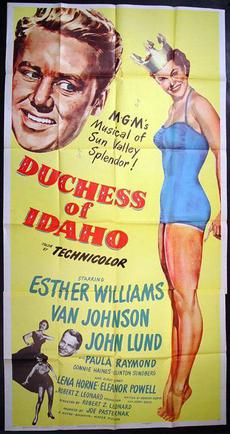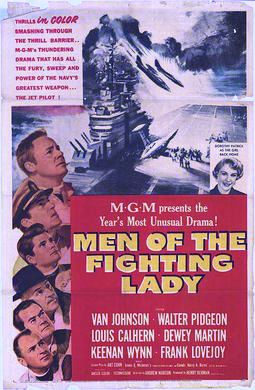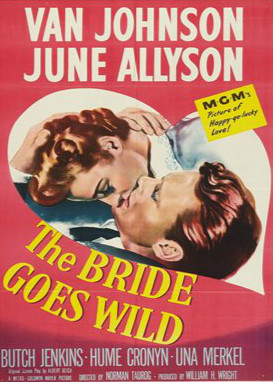
Carl Henry Vogt, known professionally as Louis Calhern, was an American stage and screen actor. Well known to fans of film noir for his role as Alonzo Emmerich, the pivotal villain in 1950's The Asphalt Jungle, he was nominated for the Academy Award for Best Actor for portraying Oliver Wendell Holmes in the film The Magnificent Yankee later that year.
The year 1950 in film involved some significant events.

Dorothy Jean Dandridge was an American actress and singer. She was the first African-American film star to be nominated for the Academy Award for Best Actress, which was for her performance in Carmen Jones (1954). Dandridge also performed as a vocalist in venues such as the Cotton Club and the Apollo Theater. During her early career, she performed as a part of The Wonder Children, later The Dandridge Sisters, and appeared in a succession of films, usually in uncredited roles.

Charles Van Dell Johnson was an American film, television, theatre and radio actor. He was a major star at Metro-Goldwyn-Mayer during and after World War II.
That's Entertainment! is a 1974 American compilation film released by Metro-Goldwyn-Mayer to celebrate the studio's 50th anniversary. The success of the retrospective prompted a 1976 sequel, the related 1985 film That's Dancing!, and a third installment in 1994.
Lindsay and Crouse was the writing team of Howard Lindsay and Russel Crouse, who collaborated famously on a succession of Broadway plays and musicals for 27 years during the mid 20th century. Their first collaboration was the rewriting of the book for the Cole Porter musical Anything Goes in 1935. They continued to co-pen books for Broadway musicals through 1962, including Rodgers and Hammerstein's The Sound of Music in 1959. They also penned several successful comedies; notably winning the Pulitzer Prize for Drama in 1945 for their original play State of the Union. Several of their works were adapted into motion pictures. The team also co-produced the original production of Arsenic and Old Lace by playwright Joseph Kesselring.
AFI's 100 Years...100 Stars is the American Film Institute's list ranking the top 25 male and 25 female greatest screen legends of American film history and is the second list of the AFI 100 Years... series.

Duchess of Idaho is a musical romantic comedy produced in 1950 by Metro-Goldwyn-Mayer. Directed by Robert Z. Leonard, it was the fourth film pairing Esther Williams and Van Johnson. It was filmed at the MGM Studios lot and exteriors shot in Sun Valley, Idaho.
"Frankie and Johnny" is a murder ballad, a traditional American popular song. It tells the story of a woman, Frankie, who finds her man Johnny making love to another woman and shoots him dead. Frankie is then arrested; in some versions of the song she is also executed.

Father's Son is a 1931 American pre-Code melodrama film which was produced by Warner Bros. in 1930 and released early in 1931. The movie is based on the original film scenario Old Fathers and Young Sons by Booth Tarkington. The film is also known by the name "Boy of Mine."

Good News is a 1947 American Metro-Goldwyn-Mayer musical film based on the 1927 stage production of the same name. It starred June Allyson, Peter Lawford, Mel Tormé, and Joan McCracken. The screenplay by Betty Comden and Adolph Green was directed by Charles Walters in Technicolor.

The Human Comedy is a 1943 American comedy-drama film directed by Clarence Brown. It began as a screenplay by William Saroyan, who was expected to direct. After Saroyan was removed from the project, he wrote the novel of the same name and published it just before the film was released. Howard Estabrook was brought in to reduce the run time to two hours. The picture stars Mickey Rooney with Frank Morgan; also appearing in the film are James Craig, Marsha Hunt, Fay Bainter, Ray Collins, Van Johnson, Donna Reed and Jackie "Butch" Jenkins. Barry Nelson, Robert Mitchum and Don DeFore appear together as boisterous soldiers in uncredited supporting roles.

Two Girls and a Sailor is a 1944 American musical film directed by Richard Thorpe and starring Van Johnson, June Allyson and Gloria DeHaven. Set on the American homefront during World War II, it's about two singing sisters who create a lavish canteen to entertain members of the military, thanks to financial contributions from a mysterious donor. The picture features a host of celebrity performances, including Jimmy Durante doing his hallmark "Inka Dinka Doo", Gracie Allen, and Lena Horne. Richard Connell and Gladys Lehman were nominated for the Academy Award for Best Original Screenplay.

Invitation is a 1952 American melodrama film directed by Gottfried Reinhardt and starring Van Johnson, Dorothy McGuire and Ruth Roman. Johnson and McGuire play a happily married couple, until the wife learns a secret about her husband. The film was based on the short story "R.S.V.P." by Jerome Weidman. The theme song "Invitation" has since become a jazz standard.

Two Weeks with Love is a 1950 romantic musical film made by Metro-Goldwyn-Mayer. It was directed by Roy Rowland and based on a story by John Larkin, who co-wrote the screenplay with Dorothy Kingsley.

Men of the Fighting Lady is a 1954 American war drama film directed by Andrew Marton and starring Van Johnson, Walter Pidgeon, Louis Calhern and Keenan Wynn. The screenplay was written by U.S. Navy Commander Harry A. Burns, who had written a Saturday Evening Post article, "The Case of the Blinded Pilot", an account of a U.S. Navy pilot in the Korean War, who saves a blinded Navy pilot by talking him down to a successful landing. Men of the Fighting Lady was also inspired by another Saturday Evening Post article, "The Forgotten Heroes of Korea" by James A. Michener. The original music score was composed by Miklós Rózsa. It is also known as Panther Squadron. It is not to be confused with the 1944 documentary The Fighting Lady, which was mainly filmed aboard the USS Yorktown (CV-10).

Moment of Danger is a 1960 British crime drama film starring Trevor Howard, Dorothy Dandridge and Edmund Purdom. It was filmed in Europe in the late months of 1959.

The Bride Goes Wild is a 1948 American romantic comedy film directed by Norman Taurog.

Strictly Personal is a 1933 American pre-Code drama film directed by Ralph Murphy, written by Beatrice Banyard, Willard Mack, Wilson Mizner, Casey Robinson and Robert T. Shannon, and starring Marjorie Rambeau, Dorothy Jordan, Eddie Quillan, Edward Ellis, Louis Calhern, Dorothy Burgess and Rollo Lloyd. It was released on March 17, 1933, by Paramount Pictures.

Her Husband Lies is a 1937 American drama film directed by Edward Ludwig and written by Wallace Smith and Eve Greene. The film stars Gail Patrick, Ricardo Cortez, Akim Tamiroff, Tom Brown, Louis Calhern and June Martel. The film was released on March 13, 1937, by Paramount Pictures.














